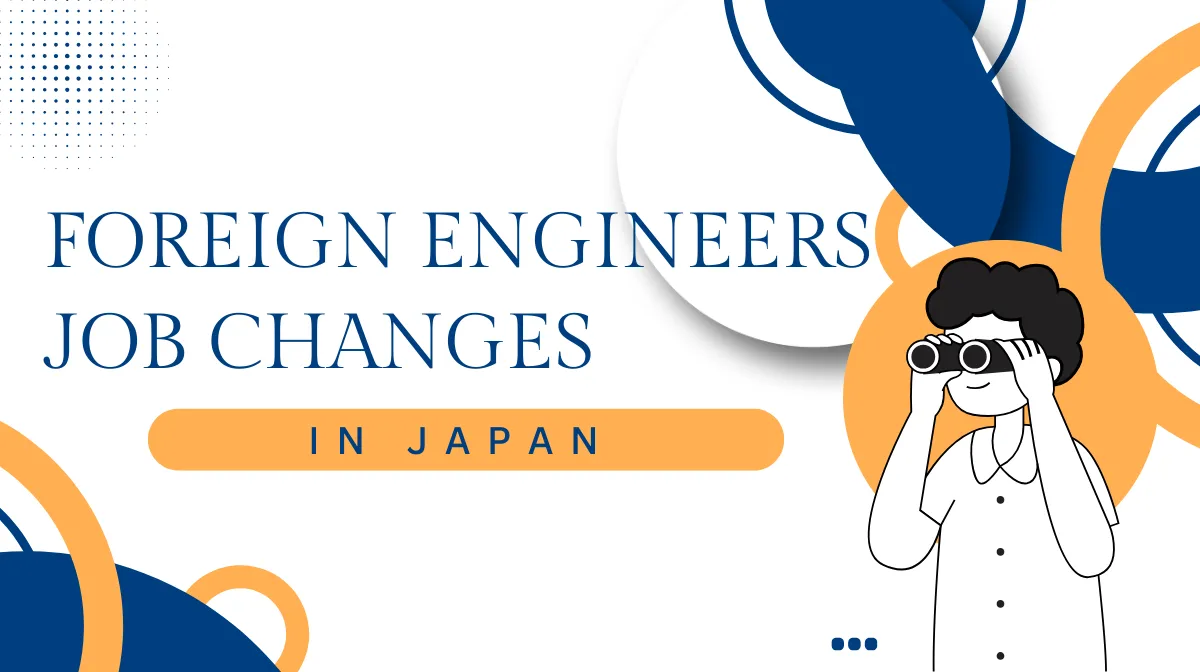For foreign engineers working in Japan, changing jobs represents a significant opportunity while also bringing concerns about residence status (visa) implications.
Particularly for engineers holding the “Engineer/Specialist in Humanities/International Services” visa, proper procedures and planning are essential when changing jobs.
This article introduces specific steps and advice for successfully changing jobs while maintaining your residence status.
1. Benefits and Risks of Job Changes for Foreign Engineers in Japan

When foreign engineers working in Japan consider changing jobs, they need to carefully weigh various benefits and risks.
It’s important to make comprehensive judgments that include not only improvements in work environment and salary, but also the impact on residence status (visa).
Benefits: Expanded Opportunities for Salary Increases and Technical Skill Development
Japan’s IT industry offers potential salary increases of 10-30% on average through job changes.
Foreign engineers with strong Japanese language skills and specialized technical expertise have high market value, and those transitioning from startups to large corporations can also expect improved benefits.
Additionally, exposure to different corporate cultures and development environments expands your technology stack, and new projects provide opportunities to acquire high-value skills in the market.
Furthermore, work experience at multiple companies can be positively evaluated for future permanent residence applications, and job changes provide opportunities to choose career directions such as management or specialist positions.
Risks: Important Considerations Regarding Residence Status (Visa)
Job changes also involve risks specific to foreign engineers.
Notification to the Immigration Bureau is mandatory within 14 days of changing jobs, and required documents and examination difficulty vary depending on the category of the new employer.
Delays or errors in procedures can negatively affect future visa renewals, so careful attention is required.
Additionally, adapting to new work environments poses challenges, and companies vary in their support systems for foreign employees, which must be considered.
Cases Requiring Special Attention
- When the next job is not secured after resignation (may affect residence status maintenance)
- Job changes when residence period is approaching expiration (risk of affecting renewal procedures)
- Cases involving significant job category changes (may require residence status change applications)
Success Stories: Common Traits of Foreign Engineers Who Achieved 20% Average Salary Increases
Foreign engineers who successfully changed jobs and achieved salary increases or improved work environments share common characteristics.
To succeed in job changes, a strategic approach that maximizes benefits while minimizing risks is important.
Common Traits of Foreign Engineers Who Successfully Increased Their Salaries
- Started job hunting activities more than one year before residence period expiration
- Confirmed necessary procedures and documents in advance and created schedules
- Utilized professional support
- Continued self-study outside work hours to acquire high-value skills in the market
- Made efforts to improve Japanese language ability, achieving N2 level or higher Japanese proficiency
Furthermore, they actively participated in industry events and meetups, built networks through SNS and tech communities, and regularly exchanged information with other foreign engineers in similar situations.
2. Basic Knowledge About Residence Status (Visa) to Confirm Before Job Changes

For foreign engineers to successfully change jobs in Japan, accurate knowledge about residence status (visa) is essential.
Particularly, those working under the “Engineer/Specialist in Humanities/International Services” residence status need to understand procedures related to job changes.
Key Points for Foreign Engineers with “Engineer/Specialist in Humanities/International Services” Visa Job Changes
“Engineer/Specialist in Humanities/International Services” is a residence status held by many foreign IT engineers.
This status permits employment in specialized and technical fields, covering activities such as engineering, programming, and system design.
However, work deemed as simple labor is not included, so attention is required.
When changing jobs, it’s important to confirm whether the duties at the new workplace fall within the activity scope of the residence status, the relationship between your educational and work background and the new position, and the scale and stability (category classification) of the new employer.
The residence period can be up to 5 years maximum, generally granted for 1, 3, or 5 years. Initial periods are often short, with longer periods typically granted upon renewal.
Reference: Immigration Services Agency: “Engineer/Specialist in Humanities/International Services”
Understanding the Relationship Between Residence Period Expiration and Job Change Timing
The relationship between job change timing and residence period expiration is very important. If more than one year remains before expiration, leisurely job hunting activities are possible, and 6 months to 1 year before expiration allows for careful progression without problems.
However, job changes within 6 months of residence period expiration require simultaneous renewal and job change procedures, requiring special attention.
Specific Relationship Between Residence Period Expiration and Job Hunting Activities
- When there’s ample time before expiration (more than 1 year): Normal job hunting activities and notification only
- When less than 6 months remain before expiration: Need to proceed with renewal applications in parallel with job change preparations
- When expiration is imminent: It’s wise to complete renewal first, then consider job hunting activities
Additionally, ideally the next job should be secured immediately after resignation, and gaps of 3 months or more may require explanation during the next residence status renewal.
Longer gaps may result in shorter residence periods being granted, so caution is advised.
Impact of Job Category Changes Through Job Changes on Residence Status
Even within the same “Engineer/Specialist in Humanities/International Services” residence status, job category changes can potentially affect residence status.
Job changes such as from backend engineer to frontend engineer within the same technical field generally have little impact on residence status, requiring notification but usually not requiring status change applications.
Cases Requiring Change Applications Require Attention
Job changes from engineer to marketing or consultant positions, representing changes from “Engineer” to “Specialist in Humanities/International Services” often require residence status change applications.
To confirm job category changes accompanying job transfers, check the “work qualification” listed on your current residence card, consult with HR personnel at the new company or administrative scriveners, and if unclear, use the Immigration Bureau’s consultation services.
Reference: Immigration Services Agency: Consultation Services
■日本でエンジニアとしてキャリアアップしたい方へ
海外エンジニア転職支援サービス『 Bloomtech Career 』にご相談ください。「英語OK」「ビザサポートあり」「高年収企業」など、外国人エンジニア向けの求人を多数掲載。専任のキャリアアドバイザーが、あなたのスキル・希望に合った最適な日本企業をご紹介します。
▼簡単・無料!30秒で登録完了!まずはお気軽にご連絡ください!
Bloomtech Careerに無料相談してみる
3. Three Essential Procedures During Job Hunting Activities

When foreign engineers change jobs, there are mandatory legal procedures that must be performed.
Failure to complete these can negatively affect future visa renewals and permanent residence applications, so it’s important to understand them thoroughly and respond within deadlines.
Resignation Notification: Mandatory Procedure Within 14 Days
Notification to the Immigration Bureau upon resignation is legally mandated and is an important procedure often overlooked by many foreign nationals.
There is a legal obligation to complete this within 14 days of the resignation date, and failure to notify may result in penalties. The documents to submit differ depending on whether the next job is secured.
Documents to Submit
- When resignation and job change occur simultaneously (Type A): Submit “Contract Termination and New Contract Conclusion Notification Form”
- When only resigning without a secured next job (Type B): Submit “Contract Termination Notification Form”
- When next job is secured after Type B notification (Type C): Submit “New Contract Conclusion Notification Form”
Notification methods include online (electronic notification system), mail, or in-person submission at offices.
Even if you’ve failed to notify in the past, it’s important to submit notification immediately upon realizing this. By honestly explaining past non-notification situations and demonstrating intention to properly complete procedures going forward, problems can be minimized.
Reference: Immigration Services Agency: Notification Procedures by Affiliated Organizations
Residence Status Confirmation Upon Securing New Job: Obtaining Certificate of Authorized Employment
Once your new job is secured, it’s important to confirm whether the duties at the new workplace are within the activity scope permitted by your current residence status. The “Certificate of Authorized Employment” is helpful in this regard.
This document certifies whether you can engage in specific duties at a specific company, providing official proof that you can work within your residence status scope. While obtaining it is optional, having it provides peace of mind.
Having this certificate allows you to demonstrate to the new employer that there are no residence status issues, prevent future troubles, and expect smooth procedures during residence status renewals.
Particularly when there are changes in job categories or duties, obtaining this certificate allows you to start your career at the new workplace with confidence.
Reference: Immigration Services Agency: Certificate of Authorized Employment Application
Confirming New Employer’s Category: Important Point Affecting Examination Difficulty
The category (scale and track record) of your new employer significantly affects examination difficulty and required documents during visa renewals.
New Employer Category Classifications
- Category 1: Listed companies, etc. (relatively easy examination)
- Category 2: Unlisted companies above a certain scale (moderate examination)
- Category 3: Small and medium enterprises (more detailed examination)
- Category 4: Small-scale companies (most stringent examination)
Category confirmation can be done by checking listing status through company IR information and securities reports, investigating company scale through corporate websites and job information, and directly confirming with recruitment agents or HR personnel.
For transfers to Category 1 and 2 companies, basic documents only are required, but Category 3 requires additional documents showing company stability, and Category 4 requires detailed documents including detailed duty explanations and company financial status.
When your new employer is Category 3 or 4, keep in mind that more document preparation and detailed duty explanations will be needed, and plan for early preparation.
4. Required Procedures and Document Lists by Job Change Pattern

Job changes for foreign engineers require significantly different procedures depending on remaining residence period and whether job categories change.
Here, we’ll explain in detail the necessary procedures and required documents for three typical patterns.
Pattern ①: When There’s Ample Time Before Residence Period Expiration and Job Category Doesn’t Change
Pattern ① applies when there’s 6 months or more remaining before residence period expiration and the job category doesn’t change significantly. This has the simplest procedures and applies to most foreign engineers.
Required Procedures for Pattern ①
Resignation/job change notification (within 14 days) and optional application for Certificate of Authorized Employment. Required documents include notification form regarding contracted organization (Type A: when resignation and job change occur simultaneously) and copy of residence card.
When applying for Certificate of Authorized Employment, you’ll need: Certificate of Authorized Employment application form, copy of employment contract or labor condition notification, company registration certificate (for Categories 3 and 4), and job description (when job category differs slightly).
Procedure Flow
Prepare necessary documents before resignation, submit contracted organization notification form within 14 days after resignation.
Then begin employment at the new workplace and apply for Certificate of Authorized Employment as needed. While procedures are relatively simple in this pattern, we recommend applying for the Certificate of Authorized Employment to confirm activities fall within residence status scope.
Pattern ②: Simultaneous Processing of Renewal and Job Change When Residence Period is Approaching
When less than 6 months remain before residence period expiration, you need to simultaneously handle job change and residence period renewal procedures. Planned progression is particularly important in this case.
Required Procedures for Pattern ②
Resignation/job change notification (within 14 days) and residence period renewal permission application are required.
Basic required documents for residence period renewal application include: residence period renewal permission application form, copy of withholding tax statement issued by previous company, resignation certificate, and “tax assessment certificate” and “tax payment certificate” for resident tax (particularly mandatory for Categories 3 and 4).
Additional documents are required depending on the new employer’s category. For Category 1 (listed companies), you need quarterly report copies or listing certification documents; for Categories 2 and 3, you need copies of the previous year’s withholding tax statement summary (with reception stamp).
For Categories 3 and 4, you’ll additionally need: company’s full certificate of registered matters, materials showing business content, most recent financial statements, and copy of employment contract or labor condition notification.
For Smooth Examination
It’s also good to prepare employment reason letters, documents explaining that duties fall within residence status activity scope, and documents explaining relationships between educational background and job duties.
Job changes when residence period is approaching require particularly careful timing of document preparation and applications. We recommend seeking professional support (administrative scriveners, etc.) when possible.
Pattern ③: Residence Status Change Application When Job Category Differs from Previous Company
When job changes involve significant category changes (example: engineer to consultant or marketer), residence status change applications may be required. This represents the most complex procedures.
Required Procedures for Pattern ③
Required procedures include resignation/job change notification (within 14 days) and residence status change permission application.
Required documents for residence status change application include: residence status change permission application form, complete document set similar to Pattern ② plus detailed job description and materials explaining relationships between educational/work background and new duties.
Specific examples of changes from “Engineer” to “Specialist in Humanities/International Services” include transfers from programmer to marketing staff or technical consultant to business consultant.
Examples of changes from “Engineer” to “Business Manager” include transitions from engineer to company manager or executive, or technical leader to management position.
Regarding Examination
During examination, it’s important to clearly demonstrate that educational and work background relate to the new job category, emphasize that duties require specialized knowledge and skills.
Additionally, you must specifically explain that work is not simple labor and explain the necessity of foreign personnel at the new employer.
For job changes involving category changes, it’s extremely important to consult Immigration Bureau consultation services or administrative scriveners beforehand to establish application prospects. Examination periods also tend to be longer, so sufficient schedule planning is necessary.
■日本でエンジニアとしてキャリアアップしたい方へ
海外エンジニア転職支援サービス『 Bloomtech Career 』にご相談ください。「英語OK」「ビザサポートあり」「高年収企業」など、外国人エンジニア向けの求人を多数掲載。専任のキャリアアドバイザーが、あなたのスキル・希望に合った最適な日本企業をご紹介します。
▼簡単・無料!30秒で登録完了!まずはお気軽にご連絡ください!
Bloomtech Careerに無料相談してみる
5. Evaluation Points for Foreign Engineers in Job Change Interviews

For foreign engineers to succeed in Japanese company job change interviews, not only technical skills but also communication abilities and cultural adaptation skills are important evaluation points.
Here, we’ll explain specific points for receiving high evaluations in interviews.
Communication Techniques for High Evaluation Beyond Japanese Language Skills
Even without perfect Japanese, effective communication strategies can create positive impressions with interviewers.
For non-verbal communication, maintain good posture with appropriate eye contact, be conscious of smiling and include appropriate responses and nodding when listening, and choose clean, culturally appropriate attire.
Language barriers can be largely overcome through preparation and countermeasures. It’s important to simulate in advance how to convey technical content.
Communication Points in Interviews
For clear communication: choose simple words over complex expressions, use visual materials like diagrams and charts especially for technical explanations, and use English technical terms when necessary.
IT terminology is often better understood in English.
Question Response Skills
When you don’t understand: use confirmation techniques like “Is my understanding of… correct?”, take keyword notes to help organize responses, and understand underlying concerns behind surface questions.
Effective Technical Skills Appeal: Portfolio Creation Tips
Technical skills are foreign engineers’ greatest weapon. When appealing technical abilities, explaining with specific episodes and achievements is more effective than simply saying “I can do it”
Effective Portfolio Creation
Enhance GitHub/GitLab (organize to show code quality and development habits), visualize achievements (quantify project results), and clarify languages and technology stack (honestly show experience years and proficiency levels).
Methods for Explaining Technical Skills
Use the STAR method (explain in order: Situation, Task, Action, Result), explain decision-making processes for “why you chose that technology,” and appeal adaptability to new technologies and self-learning habits.
Appeal Points for Japanese Companies
Appeal documentation creation abilities (tends to be valued by Japanese companies), team development experience (code review and design review experience), and awareness of maintainability and readability (“clean code” consciousness).
Appealing “Cultural Adaptation Ability” That Interviewers Secretly Observe
In hiring foreign engineers, “cultural adaptation ability” is valued equally with technical skills.
While cultural adaptation ability cannot be acquired overnight, conveying specific learnings from life and workplace experiences in Japan can provide reassurance to interviewers.
Understanding Japanese Workplace Culture
Appeal understanding of “Horenso” (reporting, communication, consultation), punctuality attitudes, and teamwork emphasis.
Long-term Commitment Attitude
Show long-term career vision in Japan, appeal tenure at previous jobs, and demonstrate attitude toward Japanese language learning.
Specific Examples of Cross-cultural Understanding
Appeal interest in Japanese culture, successful experiences in cross-cultural environments at previous jobs, and adaptability in communication styles.
6. Post-Success Procedures and Success Strategies in New Workplace

Even after securing a job change, foreign engineers have important procedures to complete. Additionally, strategies for early success in new workplaces are important. Here, we’ll explain points for smooth adaptation after job changes and long-term career building.
Mandatory Notification Procedures Within 14 Days After Job Change
Once you begin work at your new workplace, first ensure you complete legally required notification procedures.
You have an obligation to notify regarding contracted organizations within 14 days of starting work at your new employer.
Three Submission Method Options
- Online (electronic notification system, available 24/7)
- Mail (enclose notification form and residence card copy, mark envelope “Notification Form Enclosed” in red pen)
- In-person submission (nearest Immigration Bureau)
Required Documents Vary by Job Change Pattern
- When changing jobs simultaneously with resignation: Submit “Contract Termination and New Contract Conclusion Notification Form”
- When changing jobs after temporary resignation: Submit “New Contract Conclusion Notification Form”
Even if you’ve forgotten to notify, immediately submit notification upon realizing, attach a reason letter explaining circumstances, and demonstrate intention to notify within deadlines going forward.
This notification is extremely important and failure to comply may result in penalties. While the period immediately after job changes is busy adapting to new duties, be sure to complete procedures within deadlines.
Reference: Immigration Services Agency: Notifications Regarding Affiliated Organizations, etc.
First 3 Months at New Workplace: Action Guidelines for Building Trust
The first 3 months after job changes are called the “probationary period” and represent an important period of mutual evaluation.
Trust relationships built during this period become the foundation for subsequent career development. With the spirit of “when in Rome, do as the Romans do,” first focus on adapting to corporate culture.
First Month – Consider This the Observation and Adaptation Period
- Understand unwritten rules and customs, observe communication patterns such as reporting frequency and methods
- Show willingness to ask questions immediately about unclear matters, always take notes and review explanations received
Second Month
- Prioritize making things work rather than aiming for perfection, accumulate small achievements
- Regularly seek evaluation from supervisors and colleagues, actively collect feedback, and begin making modest technical suggestions like “How about…?”
- Also work on building relationships with team members during lunch and break times
Third Month – Consider This the Value Demonstration Period
- Clarify areas of expertise and potential contributions to establish your role
- Show initiative by finding improvement points and taking action, not just completing assigned work
- Reflect on the first 3 months and share goals for the next 3 months with your supervisor
- Continue acquiring business and technical terminology and improving Japanese language skills
Long-term Career Plan: Step-up Strategy with Permanent Residence in Mind
When foreign engineers consider long-term careers in Japan, permanent residence acquisition becomes a major goal.
Permanent residence acquisition typically requires 10+ years of residence in Japan, but highly skilled professionals can obtain it earlier. Stable income and tax payment records, no criminal history, and Japanese language ability certification (N2 level or higher desirable) are also important requirements.
Utilizing the Highly Skilled Professional Points System
- Points are added for education, work experience, annual income, etc., and achieving 70+ points qualifies for “Highly Skilled Professional” residence status
- Highly Skilled Professional No. 1 allows permanent residence application after 5 years, Highly Skilled Professional No. 2 allows application in as little as 1 year
For Career Step-up
- Establish position as expert in specific fields
- Improve Japanese language ability aiming for JLPT N1 acquisition
- Re-evaluate skills and market value every 2-3 years
- Build networks through participation in industry organizations and community activities
- Contribute to Japanese society through technical blogs and seminar presentations
Reference: Immigration Services Agency: Permanent Residence Permission Application
7. Carefully Selected Resources Supporting Foreign Engineers’ Job Changes

For foreign engineers to succeed in job changes, utilizing appropriate support and resources is important.
Here, we’ll explain carefully selected resources for effectively advancing job hunting activities and residence procedures.
How to Choose Job Change Agents Specializing in Foreign Engineers
Job change agents specializing in foreign engineers provide significantly different service quality and content compared to general agents.
Characteristics of Agents You Should Choose
- Support available not only in Japanese but also in English and native languages
- Knowledge of residence status and procedure support systems
- Specialized knowledge of the IT industry and understanding of technology stacks and market value
- Networks with companies actively hiring foreign nationals
Effective Ways to Work with Agents
Use multiple agents in parallel rather than depending on one company to compare information, clearly communicate non-negotiable conditions and areas where compromise is possible, maintain contact about once weekly for status updates, and have them share post-interview company evaluations.
Effectively utilize agents at each stage: market value confirmation and job information collection when starting job hunting activities, advice on interview strategies specific to Japanese companies during interview preparation, appropriate salary and condition negotiation support during condition negotiations, and guidance on necessary documents and procedures during visa procedures.
How to Choose Administrative Scrivener Offices Supporting Residence Procedures
Residence status procedures are complex and require specialized knowledge.
Since residence status procedures can be irreversible if failed once, consider professional support especially for important job changes.
Selection Criteria for Appropriate Administrative Scrivener Offices
- Specialization in foreign resident status
- Ability to respond in English and native languages
- Rich experience handling IT industry and foreign engineers
- Capability for online consultation and remote support
- Clear fee structure and payment conditions
Situations Where You Should Request Administrative Scriveners
- Job changes involving job category changes with potential residence status change requirements
- When residence period is approaching and simultaneous renewal and job change progression is needed
- Transfers to Category 3 and 4 companies where document preparation is complex
- When you have past visa renewal or change disapproval experience and need risk countermeasures
When making requests, confirm whether initial consultations are paid or free, obtain estimates and confirm fee details before requesting. Also, have them provide necessary document lists in advance and confirm schedule and progress sharing methods for peace of mind.
Community and Networking: Methods to Connect with Engineers in Similar Situations
For foreign engineers, networks with colleagues in similar situations are very important for information gathering and emotional support.
Networking cannot be built overnight, but it’s important to gradually build trust relationships through continuous participation in technical communities.
Communities and Events You Should Participate In
- Technical meetups by language or framework
- Social gatherings for foreign engineers sharing job change and lifestyle information
- Hackathons and ideathons providing opportunities for technical skill appeal and networking
- Online communities like foreign engineer channels
Effective Networking
Networks can provide various values including: non-public job information before public posting, information about internal culture and actual conditions at potential employers, information about technologies gaining market value, and advice and guidance from senior engineers.
8. Success Stories of Foreign Engineers Who Successfully Changed Jobs

From the experiences of foreign engineers who actually succeeded in job changes in Japan, we’ll introduce success hints and practical advice.
What emerges from these success stories is the importance of preparation, utilizing specialists, and effectively appealing your strengths.
While job changes involve anxiety, these cases show that foreign engineers can achieve career advancement in Japan through planned progression.
Small Web Production Company to Major IT Company Transfer
Liu-san (28 years old, Vietnamese, Web Development Engineer) Example
Successfully transferred from a small web production company to a major IT company, achieving a 30% salary increase. He began preparation 3 months before job change, confirming residence card expiration dates and listing necessary documents, utilizing job agent advice.
For visa procedures, which were his biggest concern during job change, he coordinated to work at the new company starting the day after resignation and didn’t forget the 14-day notification. In the new environment, he wasn’t afraid to ask questions during the first 3 months and carefully observed Japanese colleagues’ methods, now successfully working as a team leader.
Job Change Pattern with Short Remaining Residence Period
Maria-san (32 years old, Filipino, QA Engineer) Example
Successfully changed jobs with only 4 months remaining before residence period expiration. Secured a more specialized position.
Consulting an administrative scrivener proved successful for the challenge of simultaneously advancing job change and residence period renewal procedures. In job hunting activities, emphasizing QA specialization including automated testing experience was evaluated, securing an offer for a more responsible position than her previous job. During technical interviews, she overcame language barriers by focusing on explanations incorporating demonstrations.
Successful Case of Job Change Involving Job Category Change
Carlos-san (35 years old, Brazilian, Infrastructure Engineer) Example
Successfully changed from infrastructure engineer to SRE involving job category change. Before job change, he confirmed business content and his skill set at the Immigration Bureau consultation window, preparing detailed materials explaining that new job duties were extensions of conventional skills.
During job hunting activities, he used multiple agents simultaneously to expand options, and in interviews appealed not only infrastructure management but also automation and DevOps knowledge. As a result, his salary increased and he gained opportunities to participate in more global projects.
Startup to Major Company Transfer
Jin-san (30 years old, Chinese, Mobile App Developer) Example
Realized transfer from startup to major company, successfully improving work-life balance. He took time choosing his new employer, communicating his desire for low-overtime environments to agents.
Technically, his GitHub personal projects and app development experience for the Japanese market were evaluated, and he continued Japanese language study during job hunting activities aiming for N1 acquisition. While initially confused by cultural differences in the new environment, he gradually adapted and now enjoys a fulfilling life with little overtime and time for hobbies.
9. Advance Preparation is Key for Foreign Engineers’ Job Changes in Japan
For foreign engineers’ job changes, advance preparation and planning are keys to success.
Ensure you complete procedures necessary for maintaining residence status within deadlines, and handle appropriately according to new employer categories and presence of job category changes.
Additionally, by appealing not only technical skills but also communication abilities and cultural adaptation skills, you can lead Japanese job changes to success, achieving both career advancement and stable residence status.

















